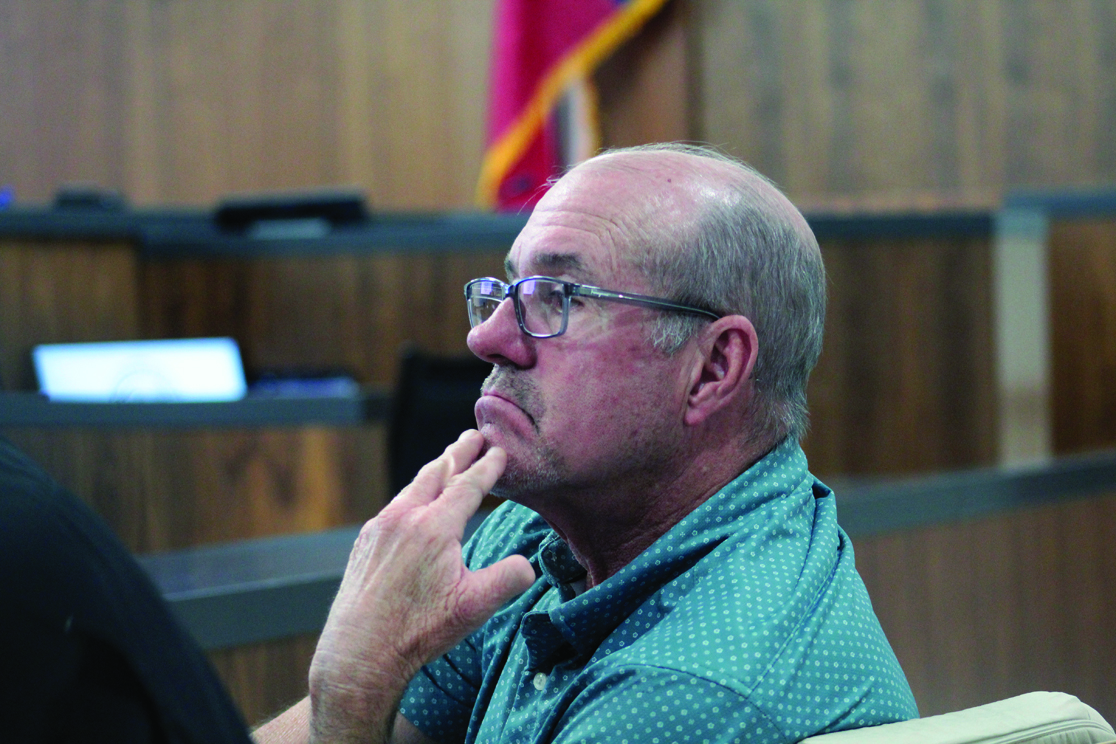Leaders note that they are seeing too many people come through the court system who get arrested on misdemeanor charges, and then get released 15 days later on a PR bond, without getting their mental health neeeds addressed. Medina County Court-at-Law Judge Mark Cashion presides over a conference of area mental health experts conducted April 24 in Hondo to discuss how to bridge that gap. (Photo by Anton Riecher)
By Anton Riecher
Mental health experts serving Medina County gathered April 24 to discuss ways to improve the county’s behavioral health care system, particularly gaining access to much needed resources in cases involving criminal prosecution.
Janna Heilig, criminal court coordinator, defined the purpose of the meeting in Hondo as helping to focus, listen and learn.
“Medina County acknowledges the importance of mental health,” Heilig said. “It impacts us in one way or another, and it’s through open conversation and shared understanding we help build resources and navigate our way on mental health for our community.”
Conducted in the upstairs courtroom of the Medina County courthouse annex, she said the space set aside for this meeting was not about judgment, but about support.
“There are valuable mental health resources available to our citizens through our local (Hill Country Mental Health and Developmental Disabilities centers) who are here with us today,” Heilig said.
Medina County Court-at-Law Judge Mark Cashion noted that, in particular, gaps in the mental health system become most apparent when dealing with incarcerated individuals.
“I guess the biggest frustration for me is we get them arrested and, in my case, because they are misdemeanors, usually 15 days later we PR (personal recognizance) them because it’s a criminal trespass or some non-violent crime,” he said.
He’d like to see them get the help they need.
Leading the local contingent of mental health workers on hand was Landon Sturdivant, deputy chief executive officer with the Hill Country MHDD, based in Kerrville.
“We are a unit of the state government,” he said. “We contract with the state of Texas, the health and human services commission, to serve as the local mental health authority for a 19-county area, which is a large swath of southwest Texas.”
Among its many services, Hill Country MHDD operates a 24-hour, seven days a week mental health crisis hotline. Through that hotline and its walk-in clinic, Hill Country MHDD “assists individuals in gaining access to crisis assessment to better determine what their needs are, if that person is requiring a level of care beyond what can be addressed on an outpatient basis,” Sturdivant said.
The agency does contract with a number of psychiatric hospitals in San Antonio, he said.
“We work very closely with our impatient partners in facilitating those admissions,” Sturdivant said. “We do have some resources to help pay for those admissions for persons who do not have insurance coverage or the ability to pay for themselves.”
He also noted that Hill Country MHDD partners closely with the Medina County Sheriff’s Office in providing mental health services to prisoners.
“As Judge Cashion was speaking of, too many times we see too many people who may be in a mental health crisis and they end up in jail on some misdemeanor charge or something like that,” Sturdivant said.
The sooner health workers can intervene in such a crisis, a person can avoid suffering in jail and working their way through the very expensive judicial system, he said. Sometimes that system becomes a “revolving door” for troubled individuals, ending with them not receiving the services or support needed.
Public defender Kani Kennell said her office has applied for a grant that would fund five mental health case workers to help the affected jail population find services when arrested or placement when released.
She described it as a means to prevent the cycle “from repeating over and over and over again.”
“If somebody’s charged with a felony and they’re found incompetent to stand trial they’re often waiting more than a year in the Medina County jail in order to get a placement in the state hospital,” Kennell said. “They’ve already been determined to have a profound mental health issue.”
Then, after hopefully regaining competency after a stay in the state hospital, the defendant has to come back to jail in order to deal with the charges, she said.
“We have to get to them quickly before they lose competency again,” Kennell said.
In response, Sturdivant announced that his agency has secured funding through a grant to embed a qualified mental health professional in the Medina County jail. The grant also included hiring personnel to manage pre- and post-release planning for continuing mental health care in the hope of reducing recidivism.
The issue is slated for further discussion during the May 5 session of the Medina County Commissioners Court in order to address the necessary interlocal agreements required.
Medina County Sheriff’s Office mental health Deputy Antonio Aguilar made reference to a recent court case in which a defendant needed medications but said he was not taking them because he could not afford the cost.
“I assured the attorney in court that is not an issue,” he said. “If the state hospital has said they are going to take these medications then they are going to get them.”
Aguilar said state hospital officials have assured him that resources exist to allow the county to recoup the cost of the necessary medications.
“We are working with them to try to have a better relationship, to try to get these things smoothed out,” he said.
Kennell said that making defendants pay for their own medications is a big issue with her clients. With only limited funds available, given the choice between purchasing commissary items they enjoy and the medications they need, the inmates make poor choices.
“A lot of times our clients who need like an anti-psychotic or something like that don’t make good, rational decisions,” Kennell said. “They’re not willing to pay out of their money in order to get that medication.”
On mental health issues outside the courtroom, Kristem Rumley with the Department of Veterans Affairs said that Medina County lacks a mental health resource specifically for veterans. She serves as community engagement and partnership coordinator for suicide prevention for 17 Texas counties, including Medina.
“That’s a huge gap,” Rumley said. “People don’t want to drive to San Antonio for these services.”
Research shows that veterans, particularly rural veterans, not engaged with the Veteran’s Administration or local health care stand at an increased risk for suicide, she said.
In conclusion, Judge Cashion said he plans to continue pushing for meetings such as the April 24th gathering to exchange ideas on how the community can improve on mental health issues.
“We’re making some progress but we’re making slow progress,” he said.
County Judge Keith Lutz said he shared the concern expressed by others at the meeting about the stigma attached to the topic of mental health.
“For me, when the community shows up and asks these questions it’s important,” Lutz said.

